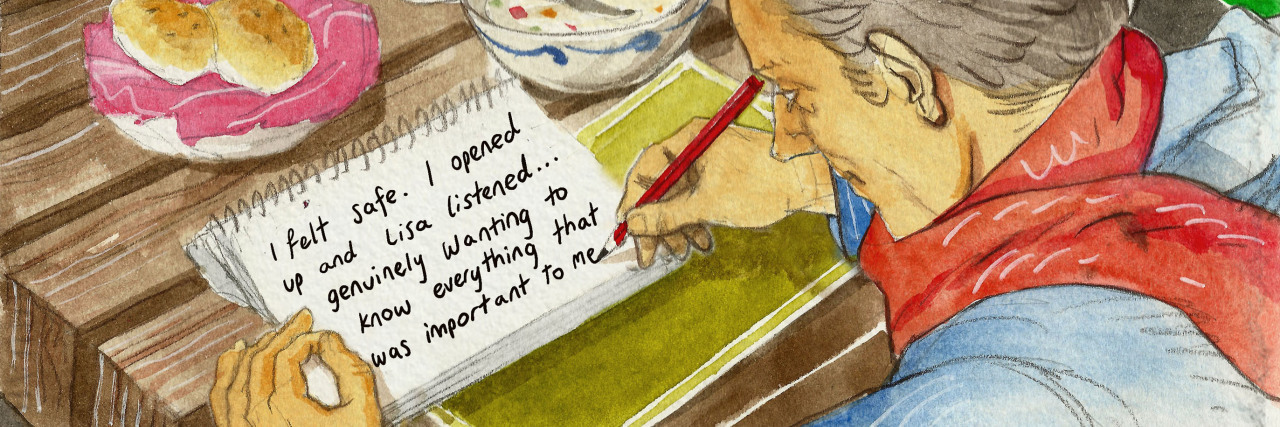I lay in bed after yet another long troubled night’s sleep – utterly exhausted, lacking all motivation. A few feet away sat a school notebook. It felt unreachable, but somehow a small spark in my brain thought it was worth trying. I reached out, picked up my pen and started to write. I wrote how I had no energy to think, let alone express my thoughts in words.
I wrote how heavy and stuck my body felt that morning. Metaphors and descriptions followed, giving some shape to this amorphous life-draining force.
And somehow it helped — just enough for me to distinguish between what depression wanted me to do (the urge to head back to bed was so strong), and what I needed to do to help myself that day. I got up, made myself some breakfast, went out and sat in the sun to eat. A seagull glided effortlessly overhead. I smiled. The day was possible.
What writing did for me:
1. It got me out of bed in the morning. So important for getting me into a good wake/sleep cycle.
2. I went places to write so felt less trapped and isolated.
3. I expressed my emotions, my most private thoughts and internal conflicts.
4. I described my pain and in doing so freed myself from it a little.
5. It brought depression, its characteristics and influences into the open so I could see and work to address them.
6. It gave me companionship.
7. I felt a sense of purpose and achievement.
8. It encouraged me look after myself and see when I was not doing so.
9. I identified very important things like the need to see a doctor and a therapist.
10. It enabled me to see and express my destructive thoughts rather than act on them.
11. I got practical feedback on what was working and what was not.
12. It gave me a small but valuable sense of control over an illness that made me feel so powerless.
What is going on in the brain?
The brain is made up of billions of cells and connecting pathways constantly communicating with each other in a complex, finely tuned way to regulate your body and all its functions. When going well it is miraculous. But in depression, the communication goes seriously awry. Your senses, thoughts, actions and emotions are all compromised. So much so that, for many, overriding the basic human need to survive becomes a very sensible option.
It’s like depression has slowly and by stealth hijacked your brain. The pathways it creates become strong, pulling more and more better-functioning parts of your brain down with it. In small but important ways, the simple act of expressing yourself with words may enlist parts of your brain that begin to reverse this downward spiral.
Why you got depressed, how it manifests and what is the best way for you to get out is in part unique to you. Observing your own particular influences through journal writing develops awareness and this not only helps your recovery now, it better protects you against future relapses.
Expressing your thoughts and emotions, gaining little insights from your writing, feeling a sense of achievement, establishing good routines; these all change your brain chemistry in small but critical ways for the better. As you build on these, you slowly strengthen your recovery and help yourself out of depression.
Tips for writing while depressed:
1. Write freely, knowing it is for you only.
2. If you feel too stuck to write, just write how “stuck” feels.
3. Any effort is good — there is no standard.
4. Be honest, but be kind to yourself too. Don’t beat yourself up, depression is doing a good job of that!
5. Write about your little successes.
6. Write when you wake up to help you get out of bed.
7. Write in different places to get you out of the house.
8. Write in the beauty of nature.
9. Write around people.
10. Remember, you don’t have to be a “writer” to write — I wasn’t!
Out of the Woods is a graphic memoir which chronicles the author’s journey out of depression and anxiety, alongside the latest research and practical self-help strategies. It’s now available for purchase on Amazon and all major booksellers. For more information, visit Outofthewoods.co.nz.
We want to hear your story. Become a Mighty contributor here.
Image via contributor and Korkut Öztekin

